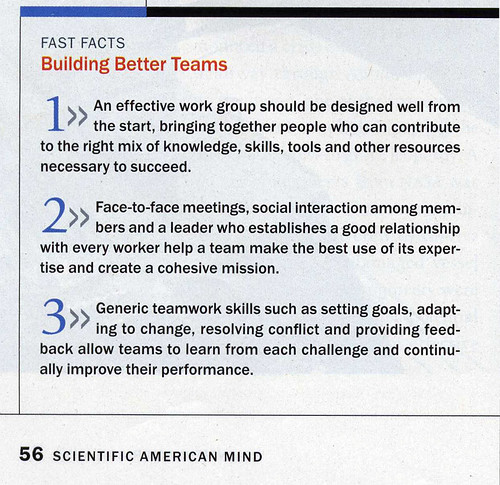Scientific American Mind discusses The Science of Team Success
Reading time: Less than a minute
In the June/July 2007 issue of Scientific American Mind, there is an article titled, The Science of Team Success, which discussed some findings from a recent review of research literature on teams.
“We recently reviewed the past 50 years of research literature on teams and identified factors that characterize the best collaborations. It turns out that what team members think, feel and do provide strong predictors of team success—and these factors also suggest ways to design, train and lead teams to help them work even better.”
Our team recently refactored our ways of collectively sharing what we learn with each other. This comes after a brief period, where our individual knowledge of new information was increasing, but shared knowledge amongst the team wasn’t. As a team, we were making wrong assumptions that everyone was spending enough individual time, learning about new techniques for doing the work that we do.
Assumptions are bad.
Once we realized that there wasn’t enough shared understanding of a few steps of our Design and Development process, we had to quickly evaluate how information was being distributed to all team members. Through this discovery, we’re now encouraging all members of our teams to have more open discussions about new ways of solving problems. While it’s up to the individual to ask questions when they don’t understand things, it’s also up to the team to approach individuals when they see something that isn’t consistent.
Everyone is a mentor. Everyone is a student. Everyone is a team member.
“A 1995 experiment by psychologist Diane Wei Liang, then at the University of Minnesota, psychologist Richard L. Moreland of the University of Pittsburgh and Linda Argote, professor of organizational behavior and theory at Carnegie Mellon University, nicely demonstrated how team members benefit from their collective knowledge when they learn together.”
While our team is far from perfect, we’re finding that our productivity levels have increased as we’ve become better at learning together. As we continue to evolve and grow our team, we’re seeking those that will add more value to our team, not just those who might consider themselves the next Ruby on Rails Rockstar.
Rely on the team, not the individual.
So, if you’re in the process of designing (or redesigning) a team, you should definitely “read this article”:":http://www.sciammind.com/article.cfm?articleID=D9058A4E-E7F2-99DF-36023504D1E43BD6.

Scanned from Scientific American Mind June/July 2007
Also, if you’re an excellent team player and feel like you flourish as an Interaction Designer or Rails Developer in a team-focued environment, introduce yourself.
Tags: